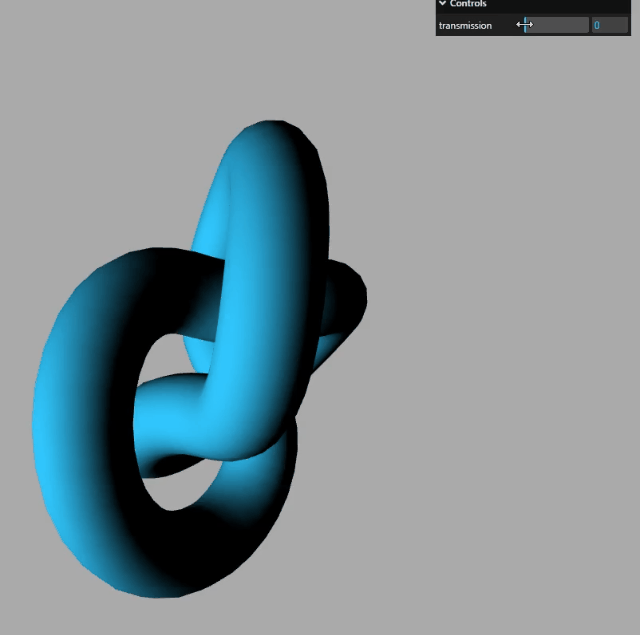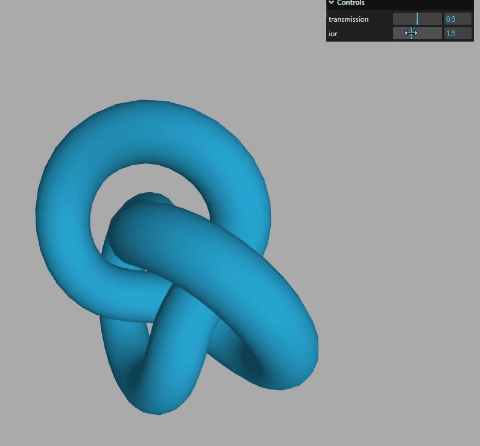Three.js——十二、MeshPhysicalMaterial清漆层、粗糙度、物理材质透光率以及折射率(结尾附代码)
环境贴图作用测试
MeshPhysicalMaterial清漆层
MeshPhysicalMaterial和MeshStandarMaterial都是拥有金属度metalness、粗糙度roughness属性的PBR材质,MeshPhysicalMaterial是MeshStandarMaterial的子集,除了继承了他的这些属性以外,还新增了清漆、透光率、反射率、光泽、折射率等等
清漆层属性.clearcoat
清漆层属性.clearcoat可以用来模拟物体表面刷了一层透明的模.clearcoat的范围0到1,默认0。
const material = new THREE.MeshPhysicalMaterial( {
clearcoat: 1.0,//物体表面清漆层或者说透明涂层的厚度
} );关于MeshPhysicalMaterial材质
MeshPhysicalMaterial是Three.js中的一种材质类型,它是基于物理的渲染(PBR)材质,可以模拟真实世界中的光照和材质反射。它支持金属和非金属材质,可以设置粗糙度、金属度、环境光遮蔽、法线贴图、位移贴图等属性,以实现更真实的渲染效果。MeshPhysicalMaterial还支持高光反射和透明度,可以用于创建逼真的玻璃、水、金属等材质。在使用MeshPhysicalMaterial时,需要注意其计算量较大,可能会影响性能,因此需要根据实际情况进行优化。
清漆层粗糙度.clearcoatRoughness
是指表面透明图层的粗糙程度范围是0-1。
使用场景
这种效果可以用来做车子的模型,比如车窗,外壳,玻璃等。 车外壳油漆效果,你可以通过PBR材质的清漆层属性.clearcoat和清漆层粗糙度.clearcoatRoughness属性模拟。
const mesh = gltf.scene.getObjectByName('外壳');
mesh.material = new THREE.MeshPhysicalMaterial( {
clearcoat: 1.0,//物体表面清漆层或者说透明涂层的厚度
clearcoatRoughness: 0.1,//透明涂层表面的粗糙度
} );实际情况可以根据模型进行调整。调整可以通过GUI进行调试,实际调试效果可以在上一章中查看。
物理材质透光率
为了更好的模拟玻璃、半透明塑料一类的视觉效果,可以使用此属性来代替普通透明属性.opacity 使用.transmission属性设置Mesh透明度,即便完全透射的情况下仍可保持高反射率。 使用方式:
const geometry = new THREE.TorusKnotGeometry(10, 3, 100, 16);
const material = new THREE.MeshPhysicalMaterial({
color: 0x30cff8,
transmission: 1,
});
const torusKnot = new THREE.Mesh(geometry, material);
scene.add(torusKnot);效果: 
折射率.ior
非金属材料的折射率从1.0到2.333。默认值为1.5。
const geometry = new THREE.TorusKnotGeometry(10, 3, 100, 16);
const material = new THREE.MeshPhysicalMaterial({
color: 0x30cff8,
transmission: 1,
ior:1.5,
});
const torusKnot = new THREE.Mesh(geometry, material);
scene.add(torusKnot);
解析gltf材质
一般默认使用标准网格材质MeshStandardMaterial,如果gltf有的材质具有.clearcoat、.transmission等属性,标准网格材质MeshStandardMaterial无法表达的时候,会用物理网格材质MeshPhysicalMaterial来解析gltf材质。
gltf.scene.traverse(function(obj) {
if (obj.isMesh) {
console.log('obj.material',obj.material);
}
});
console.log('外壳',mesh1.material);
console.log('玻璃',mesh2.material); Personal blog😶🌫️
Personal blog😶🌫️